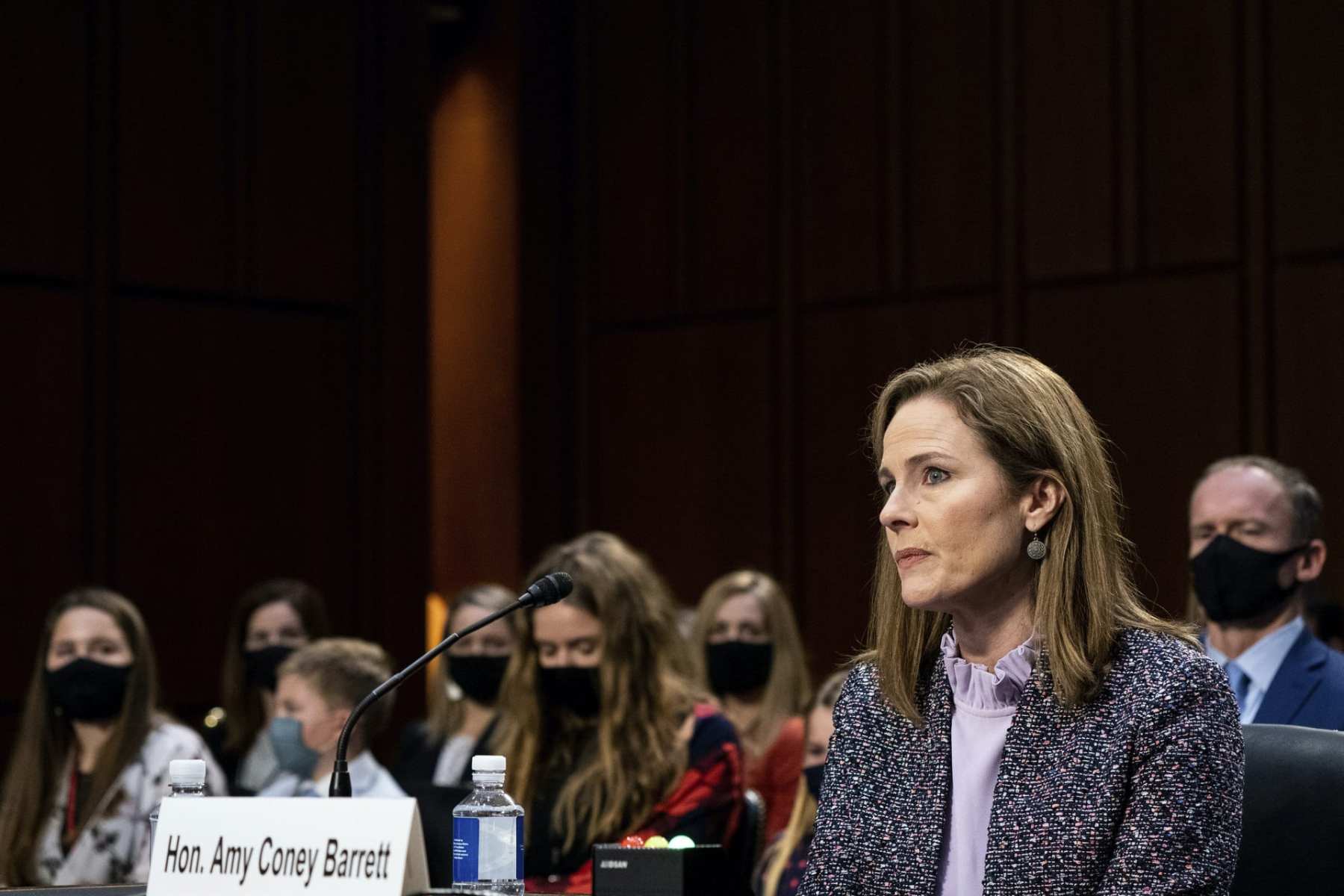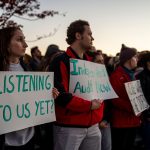As the Senate hurtles toward confirming Supreme Court nominee Amy Coney Barrett, emerging details about her judicial history are concerning advocates for sexual assault survivors. They say her record could foreshadow rulings that reduce protections for people who have experienced assault or harassment.
Advocates are pointing to two major sexual assault rulings from the 7th Circuit Court of Appeals, which Barrett joined in 2017. Both rulings — one from 2018 concerning an assault in county jail, and a 2019 case looking at college campuses — undercut efforts to curb sexual misconduct by casting it as a personal offense rather than an institutional issue, advocates said.
“The point of view that’s forwarded is that sexual assault is a function of individual behaviors — it’s one bad apple — but that institutions have no role to play, that they’re not liable,” said Shaunna Thomas, the executive director of Ultraviolet, a progressive group that advocates for gender equity. “It is not a function of a bad apple here and there. It is everywhere, and it is systems and institutions enabling that behavior and protecting and in some cases elevating sexual predators to positions of more power.”
The Supreme Court could have numerous opportunities over the coming years to weigh in on how institutions handle sexual misconduct, as a wave of lawsuits that stemmed from efforts by the Obama administration to curb sexual assault on college campuses wind their way up to the high court. Experts said they imagined the court’s conservative majority, which Barrett would likely join, could rule in a way that affects survivor protections and broader jurisprudence on cases of sex discrimination.
The White House did not respond to requests for comment from Barrett.
In 2018, Barrett joined an opinion in Martin v. Milwaukee County to effectively undo a jury’s verdict awarding $6.7 million from the county to a woman inmate who had been repeatedly sexually assaulted by a jail guard — by holding that the county was not liable, and that only the guard was responsible for damages. The inmate, Shonda Martin, said she was assaulted multiple times while in custody, including while pregnant and after giving birth.
The ruling, which Barrett joined, found that even though the assaults had occurred within the jail, they were not performed “within the scope of employment,” because Milwaukee County has a policy forbidding guards from sexual contact with incarcerated people. That, the appeals court argued, meant that the county was not liable.
“The panel held that no reasonable jury could conclude that the sexual assault were improper methods of carrying out employment objectives — even though part of the job of the corrections officer is to control and discipline, and to exert power over inmates,” said Emily Martin, the vice president of education and workplace justice at the National Women’s Law Center. “It seems to me that willfully ignores the way in which sexual assault can reflect and reinforce institutional power structure.”
But Nancy Gertner, a senior lecturer at Harvard Law School as well as a former judge, argued that it is harder to extrapolate from that particular case. That’s largely because the court was tasked with addressing a fairly narrow question of whether the assault was within his employment, and the jury had not been asked to consider whether the county had “failed to supervise” the jail guard involved.
“These cases are way more complicated than they should be,” said Gertner, who ruled on a similar lawsuit toward the end of her time on the bench.
She argued that Barrett’s other major ruling surrounding sexual assault, a 2019 case called Doe v. Purdue, which addressed sexual assault on college campuses, could be more illuminating. In that case, Barrett took the side of a male student accused of sexual assault, arguing that the university’s year-long suspension of the student could have violated Title IX, the federal civil rights law that prohibits sex-based discrimination in higher education.
Barrett also argued that Department of Education guidelines from the Obama administration — which encouraged universities to prioritize investigating sexual assault cases or risk losing federal funding — put pressure on institutions to discriminate against men.
“Part of her argument in favor of bias was essentially that the entire Obama initiative was somehow biased against men,” Gertner said. “It cast aspersions at the entire program, which wasn’t necessary” to come to a ruling.
The argument that investigating sexual assault creates an anti-male bias is flawed, said Alexandra Brodsky, an attorney at Public Justice, a non-profit legal advocacy group. It assumes that all people accused of sexual assault are men, and that all people who make accusations are women. Neither point is true, Brodsky said.
“It is clear from the opinion that the panel could not conceive of anyone other than a man being accused of sexual harassment, and implicitly, they couldn’t conceive of anyone other than a woman being a victim,” Brodsky said. “If it’s a man accusing a man, finding one side more credible than the other isn’t about anti-male bias. That’s just very clear.”
The legal philosophy behind that case has broader implications, casting anti-discrimination measures as discriminatory, Brodsky said. That could incapacitate any federal efforts to address systemic inequities based on race, gender or other factors.
“If any time a civil rights agency does its job and works to root out discrimination — if that becomes background evidence of bias against discriminators — that’s going to tie civil rights agencies’ hands,” she said.
In response to questioning from the Senate Judiciary Committee, Barrett has declined to specify how she might come down in any future Supreme Court cases. But questions of how institutions handle sexual assault, especially in the context of Title IX, are likely to appear while she is on the bench.
Already, the Supreme Court has been asked to weigh in on such cases, though it has not indicated if it will do so.
One, Bose v. Bea, looks at whether Title IX protects a student who was expelled from her college after a professor, whose alleged romantic overtures she had rebuffed, accused her of cheating. Another, Kollaritsch v. Michigan State University Board of Trustees, examines whether students who have already experienced harassment can hold a school liable for failing to respond appropriately, or if they must experience further “severe and pervasive” harassment after the report, and prove that later incidents occurred because of the school’s lackluster response.
Meanwhile, hundreds of lawsuits have been filed against individual universities regarding how they adjudicate sexual assault. Many have already been appealed, and could ultimately be heard by the high court.
If Barrett’s record offers any guidance, experts say, that could have significant consequences for curtailing efforts not only for cases of sexual assault, but also how the court examines sex and gender-based discrimination.
“Everything is at risk — everything,” Gertner said.






